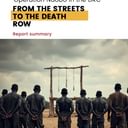
Photo by Cristi Ursea
Nearly half of all known executions to date in 2025 in Iran (244) and Saudi Arabia (50) have been for drug-related crimes, tracking closely patterns documented by Harm Reduction International (HRI) for 2024. According to HRI’s new report, The Death Penalty for Drug Offenses: Global Overview 2024, the use of the death penalty for drug-related crimes reached “crisis levels” in 2024. At least 615 people were known to be executed on drug-related charges worldwide, 607 of which took place in Iran (at least 485) and Saudi Arabia (122). This marks a 32% increase from 2023 and the “deadliest year on record” since 2015, according to HRI. Drug-related executions accounted for about 40% of all known executions worldwide in 2024 and seem to be on track to reach almost half of all executions in 2025.
Thirty-four countries retain the death penalty for drug-related offenses, even though nonviolent drug offenses do not meet the international legal threshold limiting the death penalty to the “most serious” crimes. In 2024, drug-related executions were confirmed in Iran, Saudi Arabia, and Singapore. HRI assumes they also occurred in the high application states of China, North Korea, and Vietnam, which heavily censor death penalty-related information. While almost four in five known executions for drug offense occurred in Iran in 2024, and while Singapore continues to tout its long held punitive approach to addressing drug-related crimes, Saudi Arabia saw a significant surge in drug-related executions in 2024 (122) after only two such executions in 2023 — a 6000% increase year-over-year. In a notable countertrend, Vietnam is considering legislation to eliminate the death penalty for eight of 18 offenses, including illegal drug transport.
“There is no strong evidence that the death penalty is effective in curtailing illicit drug production, trade and use, nor that it makes society safer. Rather… it causes extreme suffering, often equivalent to torture and other cruel, inhuman and degrading treatment, to the convicted person but also to their family, all the way from the sentencing up until the execution.”
Iran Executes At Least 244 for Drug Crimes in 2025, Nearly 50% of Total
According to Norway-based Iran Human Rights (IHRNGO), there have been at least 511 executions carried out in Iran in the first five months of 2025 — almost twice as many as during the same period in 2024. Of the known executions carried out this year, nearly 50%, or 244 people, were executed for drug-related offences. In May alone, 68 of the 152 people known to be executed in Iran (45%) were convicted of drug-related offenses. In 2024, according to HRI, Iran accounted for the majority of drug-related executions worldwide (at least 485). This represents 52% of all executions carried out in Iran in 2024, not significantly different from 2023.
Drug-Crimes Account for More than 50% of all Executions in Saudi Arabia in 2025
According to an AFP tally, at least 100 people were executed in Saudi Arabia from January to May 2025, 59 of whom were executed for drug-related offences. On June 10, 2025, UN experts called on the nation to halt the imminent execution of 26 Egyptian nationals sentenced to death for drug-related offenses. According to court documents, some of these prisoners have been denied legal representation and were convicted based on coerced confessions. Morris Tidball-Binz, the Special Rapporteur on extrajudicial, summary or arbitrary executions emphasized that carrying out executions for drug-related executions is “incompatible” with the nation’s “legal obligations under International Covenant on Civil and Political Rights” and highlighted that it “fails to meet the threshold of the most serious crimes.”
Last year, Saudi Arabia carried out a record-breaking number of executions, including a dramatic 6000% increase in drug-related executions, according to HRI. There were 122 people executed on drug-related charges in 2024 compared to just two executed for those charges in 2023. Foreign nationals comprised three-quarters of those executed for drug-related offenses. Among those executed were 15 people on cannabis-related charges, which HRI suggests could signal an expansion in the state’s use of the death penalty. Due to a lack of transparency, the number of new death sentences imposed and persons on death row for drug charges were not reported.
Singapore Announces New Regional Coalition at the Asia-Pacific Forum Against Drugs
At the Asia-Pacific Forum Against Drugs (APFAD), convened in mid-May, the Singaporean Home Affairs and Law Minister Kasiviswanathan Shanmugam announced the creation of a new regional coalition, the Asia-Pacific Confederation Against Drugs (APCD). According to Minister Shanmugam, APCD will bring together non-governmental organizations from Singapore, Malaysia, Indonesia, Philippines, and Hong Kong with the goals of creating “drug-free societies” and “speak[ing] up against the rising tide of liberal policies and misinformation on drugs” at international venues.
“Because we treat drug traffickers as people who ply death. They want to make money out of the death and misery of others. And so we make our laws very clear. We tell people you traffic in drugs, you face the death penalty, and we impose it.”
In his remarks, Minister Shanmugam explained that Singapore primarily uses the death penalty for drug crimes rather than homicide. Singapore has some of the strictest drug-related laws in the world, mandating the death penalty for those convicted of trafficking more than 15 grams of diamorphine (heroin), 250 grams of methamphetamine, or 500 grams of cannabis. Recently, a 58-year-old man, Mesnawi Dahri narrowly escaped the death penalty after he was found in possession of 14.99 grams of pure heroin and was instead sentenced to 31 years imprisonment. From August to November 2024 alone, Singapore executed eight people for drug trafficking, up from the five drug-related executions in 2023, according to HRI. The government has increasingly censored anti-death penalty activists, resulting in one such organization, the Transformative Justice Collective (TJC) announcing in January 2025 that it would cease operations for a two-year period.
Despite a Moratorium on Executions, Indonesia Continues to Impose New Death Sentences for Drug Offenses
Although Indonesia has not carried out an execution since 2016, the country continues to impose death sentences for drug-related crimes and is classified by HRI as a “high application state.” According to HRI, Indonesia imposed at least 73 death sentences for drug offenses in 2024, the lowest figure since 2020. Indonesia has the second highest number of persons on death row for drug crimes, reaching at least 360 people at the end of 2024.
Recently, several foreign nationals, including American, Australian, British, Indian, and Kazakh nationals, have been arrested in Indonesia for drug crimes carrying the potential penalty of death. On May 23, 2025, American national William Wallace Molyneaux was arrested in Bali for carrying packages containing 99 amphetamine pills and was charged with distribution, which is a death-eligible offense. On May 27, 2025, British national Thomas Parker was sentenced to 10 months in prison after a death-eligible charge for collecting a package of over a kilogram of MDMA, or Ecstasy, was dropped. According to AFP, narcotics agents in Bali arrested five foreign nationals on drug charges in April and May of this year. On June 3, 2025, three British nationals were charged for smuggling over a kilogram, or about two pounds, of cocaine into Bali and now face the death penalty, as well.
Vietnam Considers Legislation to Eliminate the Death Penalty for Illegal Drug Transport
Currently, the Vietnamese National Assembly is reviewing a government proposal to revise the Penal Code to eliminate the death penalty for eight of the 18 death-eligible offenses, including for illegal drug transport, as well as embezzlement, bribery, production and sale of counterfeit medicine, and certain national-security offenses. According to the current draft of the legislation, these formerly death-eligible offenses will now carry life sentences with the possibility of parole. The new penal code revision would also prohibit execution of prisoners with terminal cancer or AIDS.
The proposal has stirred up debate amongst legislators, with some calling for the retention of the death penalty for drug-related offenses. Proponents of the death penalty for drug trafficking emphasized the severity of the crime, need for deterrence, and cautioned that leniency might convey apathy towards victims’ suffering. However, Deputy Nguyen Thi Viet Nga highlighted the fact that those who transport drugs are often from lower socioeconomic backgrounds and this revision would distinguish those who are transporting these drugs from the organized manufacturing and distribution operations, all of which would continue to be death-eligible offenses.
HRI identified at least 113 death sentences imposed for drug-related offenses in Vietnam in 2024, accounting for the majority of new death sentences imposed in the nation. Due to a lack of transparency from the government, HRI could not identify minimum execution numbers for drug-related offenses or number of death row prisoners convicted of drug-related charges.
THE DEATH PENALTY FOR DRUG OFFENCES: GLOBAL OVERVIEW 2024, Harm Reduction International, 2025
Indonesia
FIRDIA LISNAWATI, British man sentenced to 10 months in Bali for drug offenses after death penalty charge dropped, AP News, May 27, 2025; American, Kazakhs in Bali face death penalty over drugs: authorities, France24 News, June 5, 2025; FIRDIA LISNAWATI, 3 British nationals accused of smuggling drugs face the death penalty in Indonesia, AP News, June 3, 2025; Foreigners in Bali Face Death Penalty Over Drugs, The Bali Times, June 9, 2025;
Iran
Group Hanging of 5 Drug Defendants in Ghezelhesar Prison, IHRNGO, June 12, 2025; Intensification of Execution Crisis in Iran: At Least 152 Executed in May, IHRNGO, June 2, 2025
Saudi Arabia
Press Release, UN expert urges Saudi Arabia to halt imminent execution of 26 Egyptian nationals for drug-related offences, UNOHCR, June 10, 2025; Taha al-Hajji, Saudi Arabia Is Executing More People Than Ever, Foreign Policy, May 16, 2025; AFP, Saudi Arabia Executed 100 People In 2025 So Far: AFP Tally, Barrons, May 3, 2025;
Singapore
Andrew Wong, Singapore to be part of new NGO coalition to tackle drug trafficking, abuse: Shanmugam, The Straits Time, May 15, 2025; Asia-Pacific Forum Against Drugs 2025 – Opening Address by Mr K Shanmugam, Minister for Home Affairs and Minister for Law, Ministry of Home Affairs, May 15, 2025; Singapore part of new regional coalition of NGOs formed to fight drug trafficking and abuse, Channel News Asia, May 15, 2025; David Sun, Drug trafficker, 58, avoids death penalty by 0.01g, sentenced to 31 years’ jail, Straits Times, June 12, 2025;
Vietnam
Gov. withdraws proposal of life imprisonment without parole from draft Penal Code, Vietnam Law and Legal Forum, June 13, 2025; Proposal to abolish death penalty for selected crimes sparks heated debate in National Assembly, Viet Nam News, May 26, 2025; National Assembly debates proposal to end death penalty for transport of illegal drugs, Viet Nam News, May 27, 2025; Legislature weighs on abolishing death penalty for drug trafficking, VN Express, May 27, 2025;



